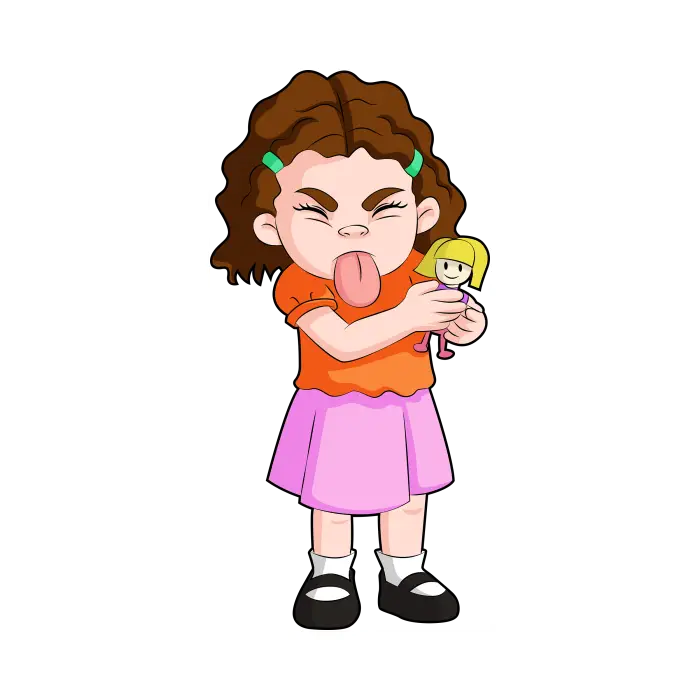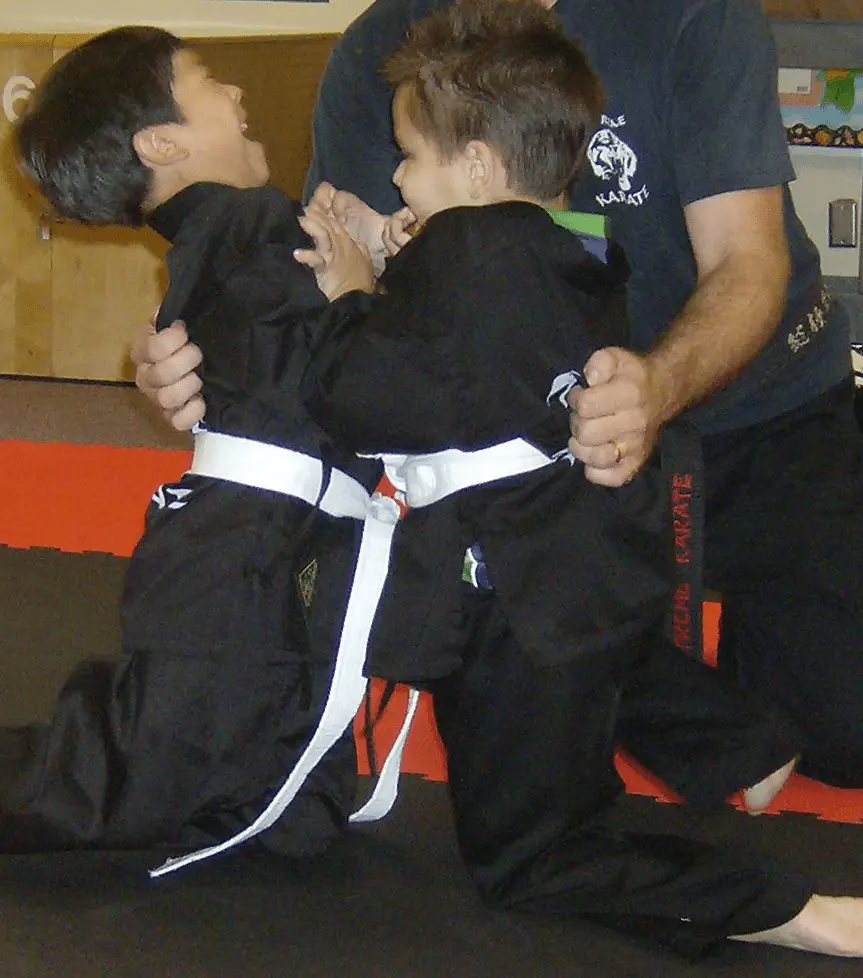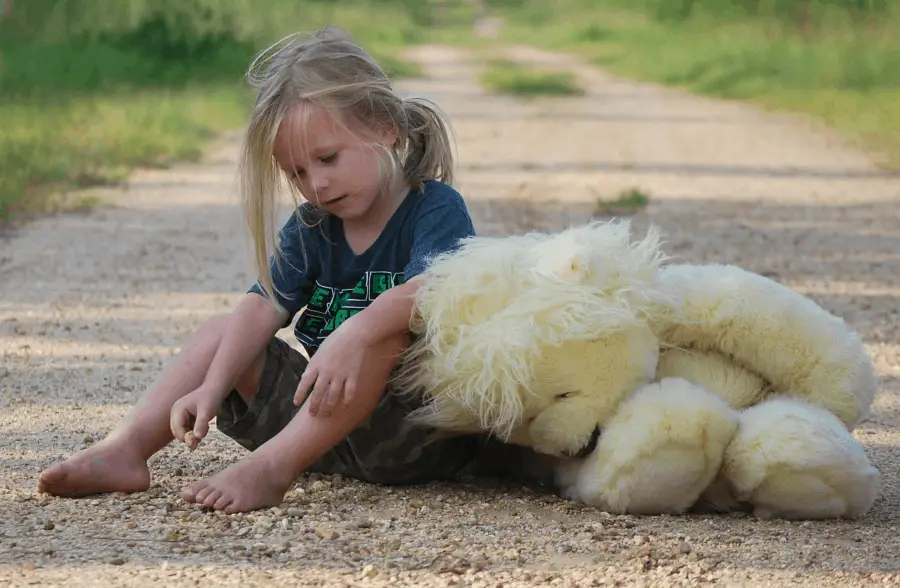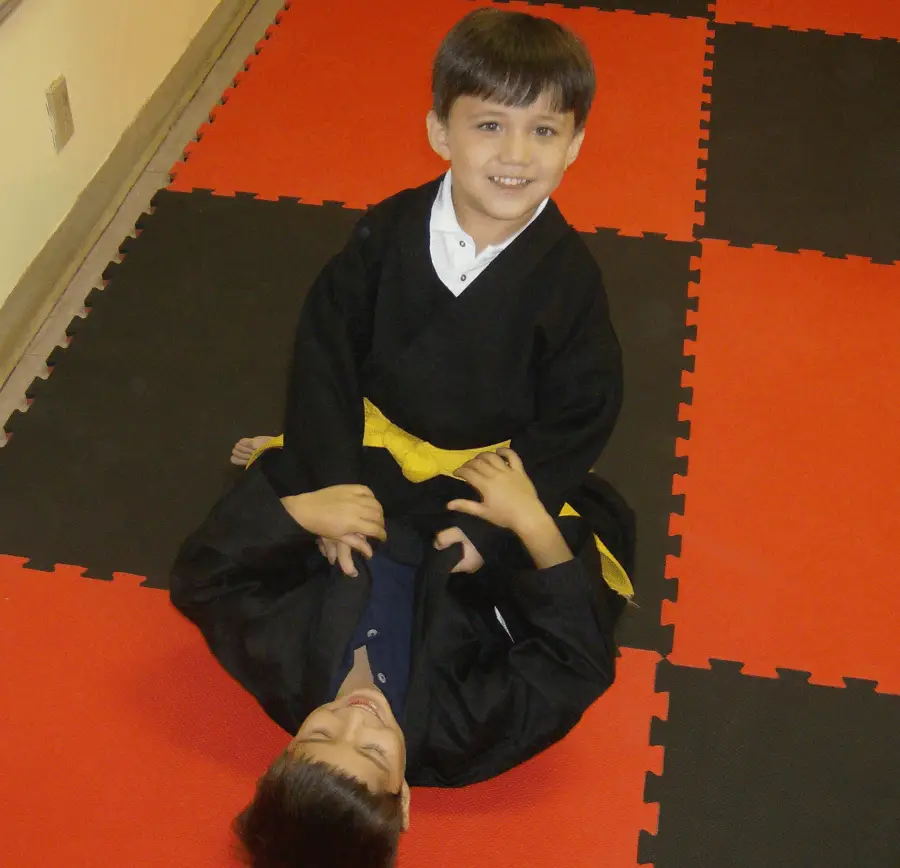
As a father of four and a martial arts teacher I know how frustrating a child’s behavior problems can be. Defiance, selfishness, and lack of impulse control can seem like an insurmountable hurdle. You just want what is best for your child and being well adjusted is one of those things. I have years of experience in a myriad of environments. Trust me, there is hope.
Martial arts can give children with behavior problems a direction and focus. The research shows that regular training in the martial arts increases self-regulation, prosocial behavior, and increasing academic test scores while decreasing aggressiveness.
There is a lot of research that has been done on the subject of behavioral issues and solutions found in the martial arts. I have 30 years of experience dealing with it first hand teaching students and my own children. Let me give you some inspiration to find a good martial arts instructor.
Contents
- What Does the Research Say About Martial Arts Solving Behavioral Issues?
- What Does Experience Dealing With Children and Behavior Problems in the Martial Arts Tell Us?
- Martial Arts Helps Children Cope With Stress and Anxiety
- Focus and Increased Concentration Can Be Achieved Through Martial Arts Training
- The Martial Arts Helps Develop Friendships and Social Connections
- The Confidence Inherent In Capable Self Defense Skills and Increased Physical Ability Cannot Be Overstated.
- The Behavior Takeaway…
What Does the Research Say About Martial Arts Solving Behavioral Issues?
Improved Self-regulation Was Achieved Through the Martial Arts
The information is not just conclusive; it is overwhelming. Martial arts if taught in a traditional way (MMA for children is a whole other problem, for another article) has been shown to not only increase mental and physical health, but also to be restorative in psychological issues.
In a study done by members of the Department of Counseling Psychology, University of Wisconsin-Madison published in the Journal of Applied Developmental Psychology, the self-regulatory abilities of children were examined. The control group continued with normal sports based exercise programs and a randomly selected group took martial arts based classes instead.
After 3 months the martial arts group demonstrated markedly greater improvements in classroom conduct, prosocial behavior, cognitive and affective self-regulation, and improved academic test scores than the other children. I am not making this stuff up. You can read the study here.
Through my experience I have seen the exact same thing occur countless times. We have all heard of troubled inner city youth being helped out of their cycles of crime through boxing. That is a theme in movies not simply because it makes for a good rags to riches story, but because it is based on how this all works. Give them a goal, a mountain to climb, make them do it the hard way, and when they reach the top they will be transformed.
There is also the mentoring aspect of the instructors, the achievement of short and long term goals, and learning to succeed in spite of the inevitable failures. Its all in the soup. If you get the right instructor that can inspire and entertain at the same time, you have gold.
Reduced Aggression Levels Attained Because of Martial Arts Training
A general misconception about classes in Karate, Judo, Taekwondo, Brazilian Jiu jitsu etc. is that they will increase aggressiveness in children. Not only is this not true, but in exact opposite is the case. Aggressiveness is shown to decrease the longer a child takes martial arts lessons.

In a study conducted by researchers at Indiana State University and published in the journal Perceptual and Motor Skills aggressiveness was studied as a function of achieving belt rank over time in a martial arts program. The study was to confirm or deny the hypothesis that participation in a combat sport increased aggressiveness in children.
The researchers found that their “analysis indicated a significant inverse relationship between the children’s Taekwondo rank and their aggression.” What does that mean in ‘regular ‘ol English’? The longer they trained and the higher their rank, the less aggressiveness they displayed, exponentially.
For those who don’t like to think about math terms and what they represent, most of us don’t after college, here is what that word ‘exponentially’ means in this context. It indicates that each rank achieved signaled not only less aggressive tendencies, but many times less than the belt before, which was many times less than the rank before that. Picture a snowball rolling down a hill and merging with other snowballs.
Again, I have seen this over and over with children no matter the age. They take on the personas of protector, defender, and helper the more rank they earn. Reaching short and long term goals and achievements have many other benefits, but reduced aggressiveness is one that you can count on.
Antibullying Success Found In Martial Arts Based Programs
A study found a problem with bullying in young elementary aged children and studied the effects of Martial Arts based instruction as an intervention plan. The researchers found fascinating results.
The study published in the journal Psychology in the Schools with the research supported by the Department of Psychiatry, Baylor College Medicine, found lower aggression levels and over time a greater helpful attitude toward the victims of bullying increasing with martial arts class attendance. This was starkly contrasted with those attending fewer classes.
The researchers went on to recommend “support for the use of martial arts–based interventions to address bullying in schools for boys, by teaching empathy, self‐control, and peaceful strategies to resolve conflicts.” Bullying is a very real problem in public schools. Children give and receive emotional scars because of many of the failings of parents and the educational system.
Martial arts taught by a good instructor can be an invaluable tool in the fight against bullying. We need to help those getting bullied as well as those committing the offences. Both can be aided by the character development of the martial arts.
You can also see the same positive effects in your child if you put the time in to find a class that interests them and an instructor that inspires them. Not only can the role modeling, discipline, and character development slowly transform them, but if you find a class that excites them, attendance and rank advancement can be used as an incentive to make good choices.
What Does Experience Dealing With Children and Behavior Problems in the Martial Arts Tell Us?
Many of the issues children face that manifest as behavioral issues stem from other underlying problems. Everything from speech delays, to stress, to deaths or illness in the family can cause behavior problems in children.

In a study published in Topics in Early Childhood Special Education (TECSE) and done by researchers at the University of Virginia they based their findings on data from the National Survey of Children’s Health.
They concluded that children in home environments with family stress of many types can contribute to speech delays. The children exhibited noticeable behavioral issues as well. At such a young age, those types of external pressures are extremely hard to deal with unless adult intervention is sought.
What I have found in dealing with children in situations spanning the spectrum, is that martial arts with its solid structures and predefined, predictable expectations can have a stabilizing effect. There is also the element of play and exploration involved that allows for the normal developmental process to evolve where other factors in their lives may stunt its operation.
There are many benefits to the martial arts that can bridge the gap when it comes to normalizing behavior and helping children to find places in their lives to feel well adjusted. When character and strength is developed within, these children become remarkably resilient when faced with forces from outside.
Martial Arts Helps Children Cope With Stress and Anxiety
Frustration is a major outcome of stress that children feel helpless to relieve. This frustration grows and begins to affect many other parts of their lives. Their grades may fall, friendships could be abandoned, and violent outbursts could arise.
A traditional martial arts answer to this situation is to instill in the child a toolbox to deal with the ramifications of such outcomes. With these tools the child will feel empowered and in control of themselves in spite of some of the chaos they may feel.
The physical side of the training will help give an outlet for the stress and through practice will learn to cope with it in a positive way. Frustration management can be learned by doing and internalizing the methods. This will increase their physical, emotional, and psychological health.
The aggression that usually accompanies the frustrations of stress can be mitigated using the techniques of avoiding conflict and impulsive actions through character formation and non-violent conflict resolution. The power is then given back to the child to control themselves.
Focus and Increased Concentration Can Be Achieved Through Martial Arts Training
Many factors can contribute to poor performance in school. My wife has been a teacher for as long as I have been a martial arts instructor. In her experience, the top obstacles between children and their learning goals are attention spans, focus, and concentration problems.

About a decade ago, a physician taking private lessons confided in me that much of the diagnosis of ADHD was misplaced and fueled by fad and incentives from pharmaceutical companies. This lined up directly with what my wife experienced in the classroom. It wasn’t a chemical or internal problem. It was a self control and focus problem.
Our kids today are overstimulated and not taught the importance of silence and contemplation, at least in the short intervals they can handle. This is not about the zoning out to a screen. This is playing or reading and escaping to that world. When is the last time you heard your children spontaneously sing?
It is not the mimic style singing of some latest YouTube sensation that I am talking about. I mean those made up songs in the middle of playing that make no sense and have no tune. I can still hear my sons and daughters singing in my head.
Focus is needed for that kind of imagination on the fly. The martial arts teaches long term visualization of goals kids may not even understand yet. It teaches them to imagine what they will be able to do one day, and helps them to reach that day. Those are life lessons that will bring back the singing. Those songs are priceless.
The Martial Arts Helps Develop Friendships and Social Connections
We all want to belong. When a child feels excluded for whatever reason, they internalize it and adopt it as part of their self picture. This leads to further self isolation and even forms of depression if the situation persists.
The martial arts classes gives them a place to associate themselves with and a group in which to belong. That can be a life preserver thrown out to them. They can use that as a solid foundation and teach themselves to regulate their moods and redefine their identities.
These kids learn to develop their social skills through partnerships and cooperation in the classes. They feel that they fit in with the other like minded children and can then take that new found confidence out to other areas of their lives. We all know the feeling of belonging. It is very powerful.
They further learn to set and share larger goals with others and get the privilege of struggling together with others. There is almost nothing that strengthens the bonds of friendships better than struggling together through adversity or challenges to reach a common goal. These friendships will allow them to go out and risk rejection to find others.
These social networks will be the foundation for healthy and well adjusted relationships in the future. We are social animals and need these connections to know our place and understand ourselves. What an awesome gift to give a child. The right traditionally minded instructor can not only be a mentor and a role model, but can usher in opportunities able to overcome the rotten apples life hands some of these kids.
The Confidence Inherent In Capable Self Defense Skills and Increased Physical Ability Cannot Be Overstated.
The physical side to the martial arts training brings a confidence that immediately breeds character traits like meekness and empathy. When you are afraid for your own safety, it is a rare thing indeed to find acts of selflessness. Let all of the food run out in the grocery stores and you will immediately see the degradation of societal empathy and courtesy.

When a child feels weak or threatened, it is their own safety that takes up most of their thoughts. They will avoid situations that feel unsafe even at the expense of others. It is only natural and most adults would react in the same way.
Yet, give the child the tools to fend off aggression and suddenly they become the superhero from their comic book that plays in their head like a movie at least once a day. Empathy for the plight of others brings out a willingness to sacrifice portions of their own safety to aide others.
This feeling of empowerment extends also to meekness in the face of temptation to become the aggressor themselves. The responsibility instilled by martial arts training enables them to be able to use their strength to impose their will, but choose not to do it. That character is absolutely foundational in traditional martial arts.
With meekness and confidence working side by side, a child will not be unbeatable by the hardships of life, but they will be unstoppable. The legendary coach of the Alabama Crimson Tide football team Vince Lombardi once said, “It’s not whether you get knocked down, it’s whether you get back up.”
The Behavior Takeaway…
The psychological and educational research shows, martial arts knocks out behavioral problems in children like almost nothing else can. It fosters an ability to self regulate in the classroom and at home. It increases kids’ abilities to perform in school and meet their potentials.
Aggression levels not only are not increased by prolonged martial arts training, but they decrease exponentially as the child achieves more and more success in their journey. They learn to simply be better citizens of whatever group they are in and thrive.
Even in children that have the proclivity to bully others are seen turning themselves into advocates for victims of such abuse. They not only curb their own aggressive behaviors, but become the champion of others. There is little else in the toolboxes of teachers and parents that affect such change.
The martial arts can and does help children cope with stress and learn to focus. It helps them develop stronger social connections and friendships as it keeps them well adjusted and grounded. The confidence it spawns in children through competent self defense skills and increased physical fitness can transform their lives.
This is only a fraction of what a good traditional martial arts instructor can do for the children in your life. It is not magic. These types of results will definitely not happen overnight. But they will happen. It is imperative if you have a child or know of one in your life that you utilize the amazing tool that is the martial arts. When they grow up they will realize what you did, and that thank you will be worth its weight in gold.
